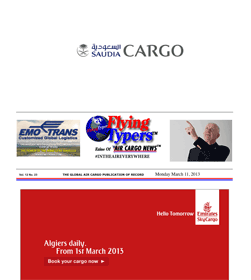 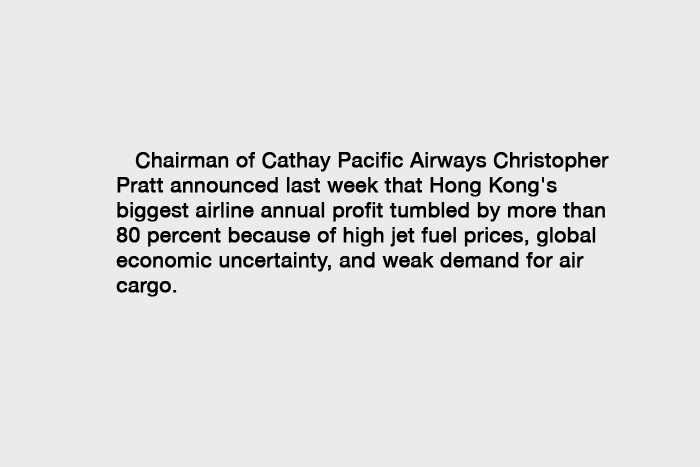 |
(Dateline
Doha)—The
IATA WCS 2013 show is in town. Inside
the big hotel with the sloping sides
and midway down a long, thin, window-walled
hallway, Uli Ogiermann sits in a comfortable
room set up for interviews.
|
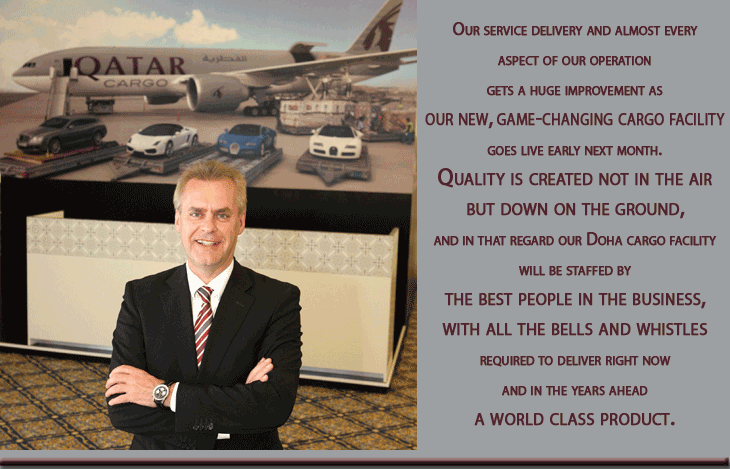 |

From the
get-go, the placement of Mr. Ogiermann
has brought to Doha a proven air cargo
executive, with leadership and performance
credentials second to none.
As CEO
of Cargolux and Chairman of The International
Air Cargo Association, Uli has weathered
every storm and has stood up and done
the right thing for the air cargo industry.
As good
and decent an individual as you might
ever know, Uli appears energized, healthy,
and absolutely thrilled to be on top
of things.

As World
Cargo Symposium began in Doha, Akbar
Al Baker, CEO of Qatar Airways as usual
made headlines all over the world painting
the canvas in a word picture of bold
and clear colors that will be recalled
as “Five By Five”:
“Our
vision is clear,” Mr. Al Baker
said.
“We
know where we are heading—ultimately,
to be among the top five air cargo operators
in the world within five years.
“And
when I say number five, that is just
what the planning people suggest.
“I
would prefer to shorten the number to
second or third place.”
A quick
look at IATA tonnage figures underscore
the dramatic shift underway as FedEx
tops the list as usual, but number two
is expected to be Emirates, which bumps
Korean from a perch it has held for
some years.
If Mr.
Al Baker’s prediction is correct,
by 2018 two of the top five air cargo
carriers in the world could be operating
from hubs less than 30 minutes apart
by air.
“Qatar
Airways Cargo is increasing by 20 percent
a year, so with the opening of our new
cargo airport in April we expect a huge
increase,” Mr. Al Baker said.

“This
year of 2013 is a real game changer
with a new cargo facility, new people
in a recently formed team, which also
takes a gigantic step in terms of capacity,
putting this airline into a different
league.”
“In
terms of capacity Qatar Airways Cargo
will grow by close to 40% in 2013.
“We
are adding 3 A330Fs (replacing 3 A300Fs)
that can lift 70 tons versus 50 on A300.
“Qatar
Cargo also takes delivery of a B777F
this summer, and adds an additional
3 A330Fs by end of this year.
“So
in total 7 new freighters are being
delivered in 2013 with net effect of
four, as A300s are phased out.
“Looking
even further ahead in the following
years, this steep jump in capacity might
not be repeated, but we will continue
to add at least 20 % every year.”
In January
Qatar Airways introduced its latest
gateway in the Republic of Iraq, adding
scheduled flights to the central city
of Najaf, which followed the move into
that country in mid 2012 with flights
to both the capital of Baghdad, and
Erbil.
On the
back of passenger demand to Iraq, Qatar
Airways said that it viewed expansion
into Iraq as “being vital, fuelled
by the country’s reconstruction
drive.”
Qatar
Airways currently operates 122 aircraft
to 125 cities across Europe, Middle
East, Africa, Asia Pacific, and The
Americas. Qatar Airways 2013 new service
was launched to Phnom Penh, Cambodia
on February 20 and the next big launch
is to Chicago on April 10.

“But
speaking about WCS here in Doha this
week,” Uli said, “It is
a great honor to host that event.”
“WCS’s
location also acknowledges the activities
that have been ongoing in Qatar air
cargo development, as this gateway emerges
among the most important current and
future global destinations.
“The
government here has endorsed and supports
aviation, and it shows.
“The
new international airport opening in
Doha toward the end of 2013 at a cost
of $15 billion will be world class and,
in many ways, world beating.
“Prior
to that opening we have a $1 billion
new cargo terminal debuting here on
April 8 that will include 55,000 square
meters.”

As mentioned,
Uli Ogermann has handled critical air
cargo posts in a long and distinguished
career of service to the industry.
But he
indicates the QR posting is different.
“The
thing that impresses me here in Doha
and throughout Qatar is the openness
of the people and especially the airline
company.
“Qatar
Airways is like a mini United Nations,
staffed with people from dozens of nationalities.
“The
result is an even richer overall culture
to everyday work that makes things quite
a bit more exciting, varied, and rewarding,
and a constant learning and doing process.
“There
is a positive spirit about things here
that is in marked contrast to working
in other parts of the world.”
“Folks
in these parts see the opportunity to
build something, to make a better life
by creating something new and wonderful,
and everybody is energized by the experience.”
“It’s
a huge challenge, but for myself and
many others, it is also a once in a
lifetime opportunity.
“The
drivers here are capital for investments,
close accountability, a baseline demand
toward excellence, and many other factors;
they give Qatar a special edge.

“We
have indeed given the CEO a scenario:
we want to be amongst the top five cargo
operators worldwide within the next
five years.
“Of
course, Mr. Al Baker noted in his opening
speech at WCS that our goal lifted the
bar, saying: ‘Of course the number
5 is what they said, but you know me,
I want our cargo business worldwide
to rank second or third in that time
span.’
“We
will have to make that work,”
Uli smiled.
“Our
service delivery and almost every aspect
of our operation gets a huge improvement
as our new, game-changing cargo facility
goes live early next month.
“Quality
is created not in the air but down on
the ground, and in that regard our Doha
cargo facility will be staffed by the
best people in the business, with all
the bells and whistles required to deliver
a world class product right now and
in the years ahead.”
In 2013
Qatar Airways celebrates 16 years since
Akbar Al Baker came on board as CEO
and changed the airline forever.
If “Sweet
Sixteen” is the charm, this is
one airline that will not be denied
a great future that aims for nothing
less than the very top of the heap.
There
was a coming out party last week in
Doha and everybody in the global village
of air cargo management saw the city,
the airline, and the air cargo future.
With Uli
at the controls there is only one way
to describe the action in Doha:
Qatar
Cargo looks “Unbeatable.”
Geoffrey/Flossie
Get
On Board Air Cargo News FlyingTypers |
Sitting
in Lisbon this Sunday, March 17, we’re
thinking about St. Patrick’s
Day in New York.
|
If
You Missed Any Of The Previous 3 Issues
Of FlyingTypers |
|||||
|
|||||
FT031113 |
FT031413 |
||||
|---|---|---|---|---|---|



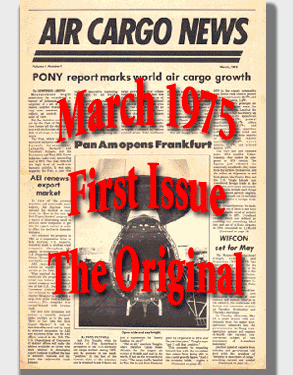
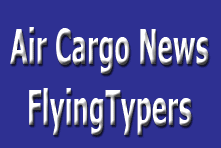
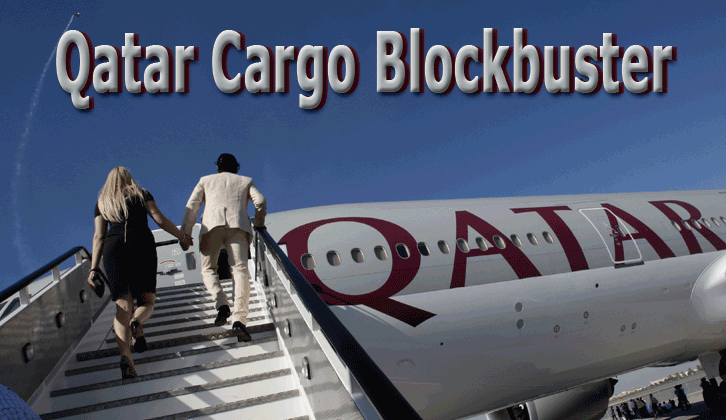


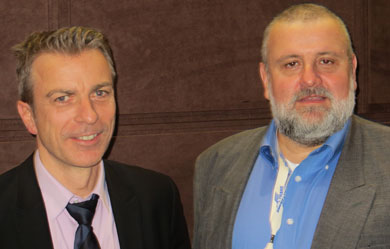 EMO
Trans Strasbourg team—left right:
Jean-Marc Richter and Eric Lefebvre.
EMO
Trans Strasbourg team—left right:
Jean-Marc Richter and Eric Lefebvre.
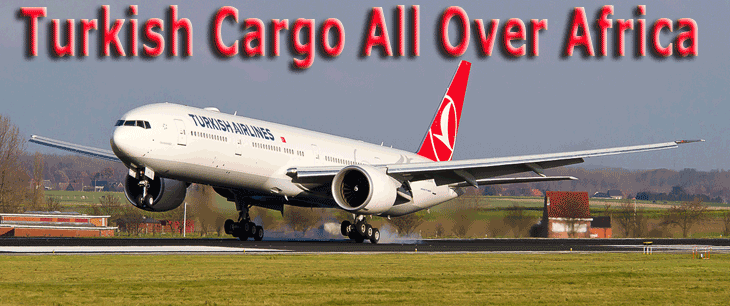
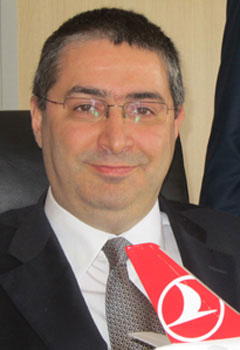
 uch admired today as a Middle East powerhouse
air carrier to the world, Turkish Airlines
Cargo dates back 77 years, when the
Istanbul-based airline carried its first
international cargo in 1936.
uch admired today as a Middle East powerhouse
air carrier to the world, Turkish Airlines
Cargo dates back 77 years, when the
Istanbul-based airline carried its first
international cargo in 1936.
